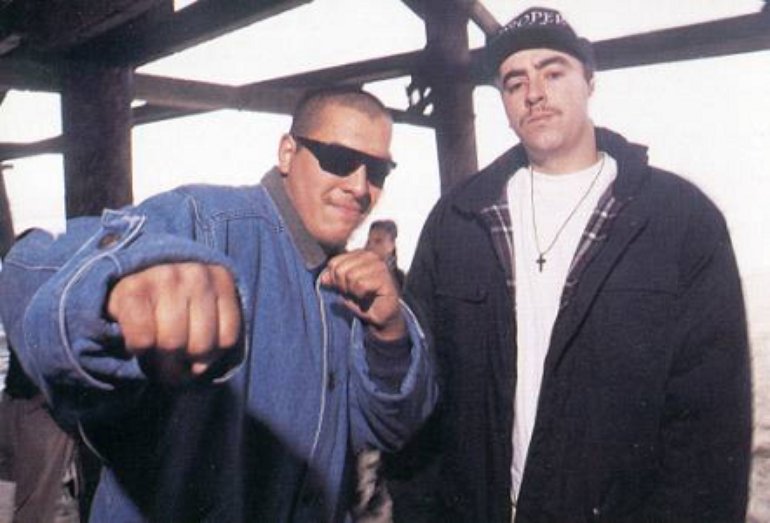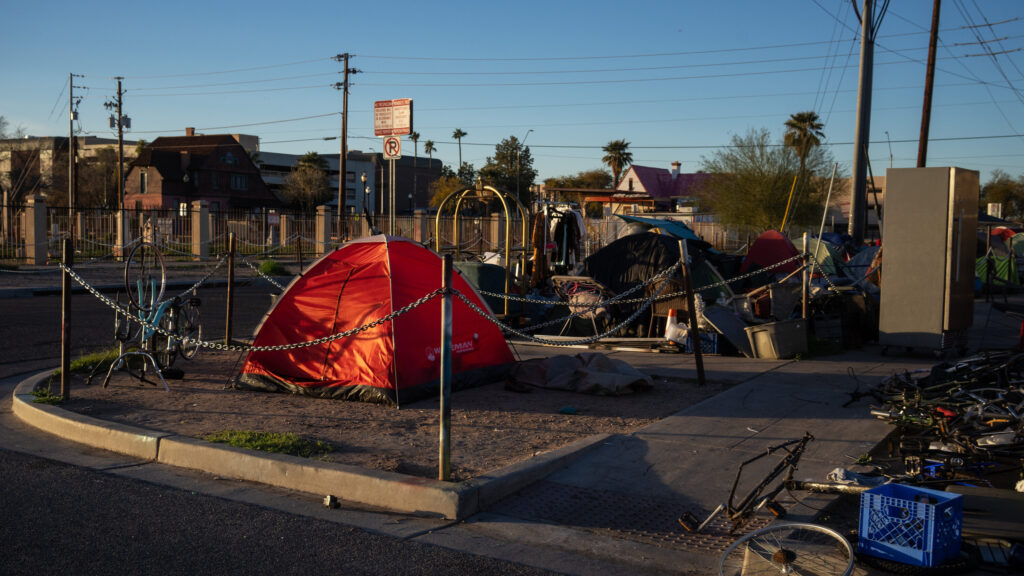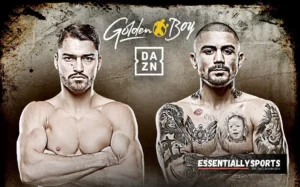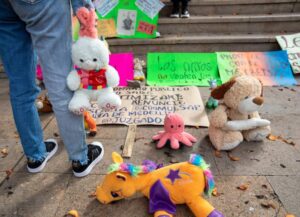
A Proper Dos History: How 1 Duo Defined Southern California Hip-Hop (11/23/2018)
La Cartita — In the early 1990’s, Proper Dos achieved notoriety with tracks like Mexican Power & Hard Times. The influence spread across neighborhoods from Japan to California and Mexico, many of these were staples for loud stereos from the time of release to now.

Frank V (left) and Ernie G (right) in the early 1990’s.
The Sound: Unique, Uncredited, But Defined a Generation
For many, as Ernie G himself pointed out, Proper Dos’ musical canon can be thought of as a time capsule. All the bangers were reminiscent of an era in many people’s crazy youth. If the late 1960’s were peace and love, then the 1980’s and 90’s were war and strife, graft and vice, that were captured best by people close to that action.
Therefore, judging from the style, Proper Dos & Frank V were always with it.
1990’s HIP-HOP: Sounds of Street Party’s, Street Wars & Boundary Pushing
The 1990’s saw the rise of an aggressive, West Coast funk-based, G’d up sound. Eventually, a version of this music was marketed to primarily white consumers. Content was created by black artists, managed by white people, though certainly exceptions to this rule existed even then.
However, prior to its mass commercialization, one offshoot of that music, which was never embraced entirely by an NY-LA marketing machine, was Chicano rap, or, really authentic G-rap, but made by Chicanos.
Not Black, Not White, Not Marketable: Chicanos
Rap made by Chicanos is alive and well, of course, with many great artists and a growing music scene. This is California music’s best kept secret. Proper Dos, then, is one of its originators.
Skanless Records: Proper Dos’ First Label
Unsurprisingly, an independent label and self-financed, took the group ‘Proper Dos’ under their management. Ernie G recalls Steve Yano’s contribution to the group: ‘Yano self-financed and developed a studio’, with gear and booths to produce music that was not super mainstream. Yano’s connections to Power 106 and other major labels kept the group tied in with certain resources but didn’t force them to compromise their sound.’It was the perfect place’, he mentioned, because I “could mix and produce records with unlimited studio time”. At the time, equipment and studio time – even today with most signed artists – is scheduled and finite. Yano’s approach was more free-form and experimental, allowing Ernie to record and produce at all hours.This certainly led to Ernie G acquiring the skills and ethic to develop labels at will, like the period of time dedicated to ‘High Caliber Music’ in the early 2000’s.
Understanding SoCal Politics of The Era
Proper Dos created many songs with lyrics referring to key events. In fact, many of these were never whole heartedly documented by academics or the press. Whereas the Watts riots were constantly referenced in the press, Chicano struggles and outrage were largely ignored and still are to an extent. For example, historical incidents, like Sureño truces called after many drive-by shootings, are commemorated in the song ‘Tales from the West Side’:
Yeah, Chicanos got a peace treaty
But you won’t see homeboys on tv
The media will shed no light, but that’s alright
Chicanos were killing each other every single night
Eses dropping left and right
Till the vatos from the pen stepped in
I guess it was a test to see who had guts
I guess it was a test to see who really had nuts
I’m sitting here rolling in my ride
Oh what the hell, just another tale from the Westside
Frank V observed that black-white racial dichotomy in the media very early on.A great lyricist, he could perceive even then that the priority was never to depict Chicano business in any dignified manner.The ‘vatos from the pen’ line highlighted the way in which some Chicanos had turned the nightmare of prisons into a strategic lever of power.Without glamorizing gangs, it should be observed that conditions for Mexicans would be objectively worse behind prison walls were Mexican runned prison gangs not present.**
Mexican Power
https://www.youtube.com/embed/S_tPtXi7h4EFortunately, Proper Dos turned that anger into a manifestation of pride with ‘Mexican Power’. Mexican Power was a pride thing to both of them:
That’s the name of this cut, man
You got somethin’ with that?
Hit the stop, eject button
Cause I ain’t shutting up for no one, not a single soul
Remember me, the loco cholo going solo
Well I’m back with a new rap, shows and fuck that
All we can do is dance around a motherfucking hat
But you’re dead wrong, those days are long gone
Because my people are coming up and we’re coming up strong
And if you don’t believe me fool, well that’s on you
Mexican Power was a lyrical rebellion on a lot of imposed labels. Chicano pride and art were pushed simultaneously, with a refusal to acknowledge Chicanos as anything but native to California. We were deserving of respect in those records.Ernie-G commented that Frank V was always an interesting writer due to having lived in Texas and later, as a young teen, in California. His take on certain keywords, emphasized and simplified what the Chicano style in California was all about. ‘Firme’, ‘Jaina’ and ‘Rola’, were just as casually intertwined with English from a Native English speaker.Chicanos are truly in a different dimension, occupy a political ideology tied to land, economy and split between the cumulative effects of two governments. Most Chicano organizations manage situations differently and away from that black-white dichotomy.Ultimately, without so much rhetoric, the unique Chicano perspective – with all the bells and whistles of any other hip-hop record – comes accross in Proper Dos’ records; the music is universal. From the funk ‘Cutie Pie’ sample interpolated in ‘Mexican Power’ or some of the oldies underlying ‘Firme Hina’, to the minor key Ernie G G-funk, the records stay banging!
sidenote: ** 50 years ago, for instance, jail time in California was an even more difficult proposition for any Mexican. Numerically and organizationally weak, the two factors combined to make Chicano men targets both within the prison yard and outside of it. Police and white vigilantes were often indistiguishable in places like Whittier, San Diego or even Los Angeles.







